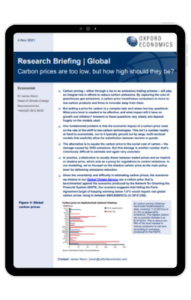Global | Carbon prices are too low, but how high should they be?

Carbon pricing – either through a tax or an emissions trading scheme – will play an integral role in efforts to reduce carbon emissions. By capturing the cost of greenhouse gas emissions, a carbon price incentivises consumers to move to low-carbon products and firms to innovate away from them.
What you will learn:
- One fundamental problem is that the economic impact of a carbon price rests on the rate of the shift to low-carbon technologies.
- This isn’t a number readily at hand to economists, nor is it typically ground out by large, multi-sectoral models that explicitly allow for substitution between sectors or goods.
- The alternative is to equate the carbon price to the social cost of carbon – the damage caused by GHG emissions.
Tags:
Related Services

Post
House prices continue to slide for China’s cities
Research Briefing Global | Carbon prices are too low, but how high should they be? While the property market downturn has been universal, the scale and depth has been varied for different cities and regions.
Find Out More
Post
The Construction Productivity Challenge in Australia
Delve into the state of construction productivity in Australia. Understand the factors affecting growth and how innovation can transform the industry for the better.
Find Out More